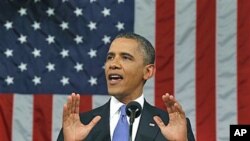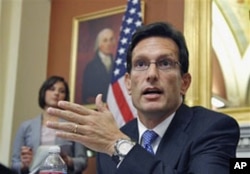One week after U.S. President Barack Obama urged Congress to act swiftly to spur job creation and economic growth, bipartisan backing for his proposals has yet to materialize. The president’s package of temporary tax cuts and short-term additional federal spending faces daunting legislative hurdles.
In a nationally-televised address to Congress last Thursday, a feisty-sounding President Obama challenged lawmakers to take a break from partisan gridlock and unite to boost a sagging U.S. economy.
“There are steps we can take right now to improve people’s lives. I am sending this Congress a plan that you should pass right away,” he said.
The $447-billion package would cut taxes paid by wage-earners, as well as businesses that hire new workers, extend government-provided jobless benefits, and boost federal spending on domestic infrastructure. Longer term, the administration wants to end corporate tax breaks and raise taxes on the wealthy.
In the Republican-controlled House of Representatives, Majority Leader Eric Cantor said he is willing to trim taxes, but opposes additional spending by a federal government already drowning in debt.
Cantor pointed out that an $878-billion stimulus plan enacted at the start of the Obama administration failed to bring U.S. unemployment below the current nine-percent range.
“The stimulus program was a failure. Why would we want to go do something like that again?” he asked.
That message is echoed by Republicans in the Senate, where the party is in the minority but can still block legislation. The ranking Republican on the Senate Budget Committee, Jeff Sessions, said the Obama jobs plan would eradicate initial savings from last month’s contentious federal budget agreement.
“Should not we think very, very carefully about a new stimulus plan that would spend $450 billion, obliterating that [budget] savings?” said Sessions.
President Obama’s allies in Congress argue America’s fiscal woes will only worsen if the economy languishes and millions remain unemployed. Democratic Senator John Kerry of Massachusetts said, “We need [economic] growth, not just revenue and not just [spending] cuts. Any economist will tell us: creating jobs today helps reduce the deficit tomorrow.”
Democrats also argue that corporations and the wealthy who benefited from previous tax breaks should be willing to pay more now in order to spare the poor and middle class from further economic pain.
Senator Richard Durbin of Illinois said, “Those who are making the highest incomes in America should join with every other family in America and help us get beyond this recession.”
This week, Congress heard conflicting testimony from two well-known economists on the value of government spending during economic downturns. The head of the Congressional Budget Office, Douglas Elmendorf, appeared to back the Obama administration’s call for short-term stimulus combined with long-term fiscal austerity.
“To provide the greatest boost to economic activity now, and the medium and long term, the combination of fiscal policies likely to be most effective would be [to] cut taxes or increase spending in the near term. But over the longer term, move in the opposite direction and cut spending or raise taxes,” he said.
Former Federal Reserve Chairman Alan Greenspan had a very different message when discussing America’s debt burden.
“Our spending is already committed to more than we have the capacity of achieving. And unless and until we understand that our problem is spending, and not taxes, I think we will lead ourselves astray,” said Greenspan.
House Speaker John Boehner urged reducing government regulation, while also cutting federal taxes and spending.
House Majority Leader Cantor said partisan disagreements on how best to invigorate the economy will set the stage for next year’s general election.
“Republicans and Democrats are not going to agree on everything. And maybe the issue of taxation and some other issues will have to be left for the election,” said Cantor.
The administration is urging Congress to hold up-or-down votes on the president’s entire jobs plan. But White House spokesman Jay Carney said the president will sign any portion that arrives on his desk.















